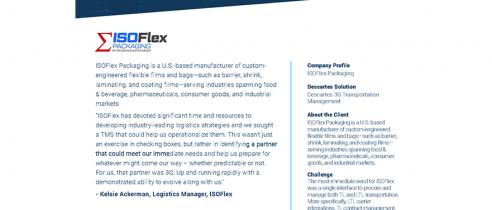Blog
5 Must-Have Benefits of A Transportation Management System

Do you often feel like your business’s transportation management is falling short? If so, you might want to consider implementing transportation management software. The benefits of a transportation management system can enable your business in multiple ways you might not have thought possible.
If you’re not using transportation management software, it might be time to consider investing. TMS software can offer plenty of benefits for your business, including improved efficiency, cost savings, and better customer service. It helps businesses plan, execute, and optimize their freight movements.
Not sure if a TMS solution is right for you? Let’s review some benefits of successful transportation management systems that might convince you.
What are Transportation Management Systems?
A transportation management system (TMS) is a software application designed to streamline the process of shipping goods. It enables companies to plan, execute and optimize their supply chain operations by automating critical tasks such as freight spend calculations, route planning, shipment tracking, load optimization, and documentation.
It can be used by businesses of all sizes but is most commonly employed by companies that regularly move large volumes of goods. There are multiple key benefits transportation management systems provide an organization.
It can help plan and execute all aspects of shipping and billing processes, from procurement and carrier selection to real time tracking through to final delivery.
Businesses can optimize shipping operations with real time data that provides visibility into areas where cost savings can be achieved and shipping errors avoided.
The goal of using a TMS is to increase efficiency and reduce the time spent to optimize the performance of company supply chains. A well-run shipping operation can lead to lower costs, improved customer service, and increased profits.
5 Reasons To Use Transportation Management Systems
There are many benefits of using a TMS, but here are the top five that can make a significant impact on your business:
1. Reduced Costs
A successful transportation management system can help your business reduce costs in a number of ways. Optimizing routes and schedules can minimize fuel consumption and labor expenses.
In addition, a good TMS can help you take advantage of discounts offered by carriers for volume shipments and reduce freight costs.
The systems at play can help an organization source the best carrier based on the logistical route the goods need to be transported, the details of customer orders, and any customized delivery times that have been mandated.
2. Improved Customer Service
A well-run transportation operation is critical to providing good customer service. TMS software can help you ensure that orders are fulfilled on time and that products are delivered in perfect condition using the most cost effective carrier.
By providing visibility into the status of shipments, a TMS can help you keep your customers informed and reduce the number of customer service inquiries and improve service quality.
Improving upon timely delivery through optimized routing is an excellent way to ensure high levels of customer satisfaction.
3. Increased Efficiency
A transport management system can help you streamline operations and improve warehouse efficiency. You can free up your staff to focus on more important tasks by automating routine tasks, such as order entry and invoicing.
TMS solutions can help you optimize your use of resources, such as transportation fleets and warehouse space as well as other integrated systems.
Administration expenses can be reduced and order management enhanced by creating efficiencies throughout the whole supply chain and by leveraging the business insights good transportation management software provides.
4. Enhanced Visibility
With real time connectivity, you can identify potential problems early by tracking shipments in real-time and taking corrective action before delays occur. Most multi channel businesses use a cloud based TMS that can provide valuable data to be used to improve planning and optimized routing.
5. Greater Control
Today’s TMS solutions provide the information you need to manage your operation more effectively. You can identify areas that need improvement by monitoring key performance indicators, such as on-time delivery rates and cost per unit.
By centralizing information and providing access to authorized users, you can ensure that everyone is working with the same data. Also, you can automate and enforce your company’s policies and procedures.

Other Advantages Offered By TMS
To streamline the transportation and logistics process for businesses, here are some other advantages that can significantly improve the efficiency and productivity of a company, as well as save on logistics costs.
- En-Route Driver Tracking: Using GPS tracking systems, businesses can monitor their fleet in real-time, reducing the chances of theft, minimizing vehicle maintenance costs, and managing resources.
- Improved Warehouse Productivity: TMS can track inventory levels and stock items at warehouses. This helps businesses know when it is time to restock certain items and improves the overall productivity of the warehouse.
- Real-Time Tracking of Deliveries: You can keep track of all shipment deliveries made by a company. This helps businesses keep track of their shipments and ensure that all deliveries are made on time, even same day deliveries.
- Inventory Management: TMS can manage inventory levels at warehouses and stores. By keeping track of the movement of goods, businesses can maintain accurate inventory levels and avoid stockouts.
- Integrated Planning and Execution: You can plan and execute transportation operations with TMS software. By integrating with other business systems, a TMS can provide complete supply chain visibility into the transportation network and allow businesses to optimize operations.
- Better Cash Flow: Businesses can improve cash flow by managing invoicing and payments for transportation services. By automating these processes, the TMS platform can help businesses save time and money.
- Centralization of Payment Procedures: TMS provides a central place to make and track payments. This can save time and ensure that all payments are made on time in addition to reducing the chance for incorrect billing.
- Enhanced Routing Capabilities: You can try TMS to enhance routing capabilities. By using historical data and real-time traffic information, a TMS can plan the most efficient route for vehicles to ensure lightning fast delivery.
- Minimal Documentation: It enhances the routing capabilities and helps to keep track of payments and other essential data. This system is helpful for those who manage large shipments or need to keep track of many different aspects of their business.Having a TMS in place can help to save time and money by utilizing electronic invoicing and thus reducing the amount of paperwork that needs to be completed.
- Aligned Dock Scheduling: Another perk is to align dock scheduling with incoming and outgoing shipments. This can help businesses to optimize their operations and avoid delays.
- Accurate Order Fulfillment: You can track orders and ensure they are fulfilled accurately. By keeping track of order status, businesses can avoid delays with the physical movement of goods through the supply chain and ensure that customers receive their products on time.
- Access to Product Information: A TMS can provide users information about the products they are shipping. This can help to improve customer service and make it easier for customers to find the products they need. In turn, this can lead to more repeat business.

What Are The Disadvantages of a Transportation Management System TMS?
There are a few disadvantages to using a TMS.
- They can be expensive to set up and maintain and require a certain level of expertise to operate effectively.
- They can sometimes create more work for shippers, as they may need to track and manage multiple shipping documents and processes.
- They are complex management systems, making it difficult to understand all the features and options available.
But in the long run, the advantages of a TMS system generally outweigh any disadvantages. By automating shipping processes and providing greater supply chain visibility, TMS software can help businesses save time and money while improving customer satisfaction and the financial aspects of third party logistics.

FAQs
What Are The Advantages and Disadvantages Of Using a Transportation Management System?
There are several advantages and disadvantages to using a transportation management system.
- It can help to streamline the process of shipping and receiving goods. This can lead to improved efficiency and reduced costs.
- The systems can provide visibility into the entire supply chain, which can help to identify problems and potential delays.
- It provides high levels of real time tracking and inventory management within the supply chain to maximize efficiency within the shipping process.
There are also a couple disadvantages that will likely impact smaller firms.
- A disadvantage of using a transport management system is that it can be expensive to implement and maintain. Additionally, it is important to have qualified staff who can use the system effectively.
- The price point and barriers of entry don’t allow for it to be leveraged by smaller companies or those with basic transportation needs.
What Benefits are Associated with Transportation Management and Warehouse Management Systems?
Warehouse management systems (WMS) and transportation management systems (TMS) are software solutions that help businesses streamline their supply chain and third party logistics operations. Both WMS and TMS can offer significant benefits, including:
- Improved Inventory Management Control: Real-time visibility of your inventory levels, so you can easily see what stock you have on hand at any given time. This can help you avoid overstocking or running out of inventory.
- Reduced Shipping Costs: By optimizing your shipping routes and using features like load consolidation, a TMS can help you to reduce your overall shipping and transportation costs.
- Greater Efficiency And Productivity: A well-designed WMS or TMS can help to streamline your operations and make them more efficient. This can free up time and resources that can be better spent on other areas of your business.
What Are The Advantages Of Transportation Management In Logistics Services?
Logistics transportation management is organizing and coordinating transportation resources and systems within a company for the physical movement of goods to customers. The main goal of transportation management is to minimize transportation costs while maximizing customer service.
The perks include:
- Superior Order Management
- Enhanced Delivery Performance
- Significant Cost Reduction
- Improved Customer Service
- Improved Carrier Relationships
Final Thoughts
A thriving transportation management system can provide many benefits for your business. By reducing costs, improving customer service, and increasing efficiency, a TMS can help you improve your bottom line. Furthermore, by enhancing visibility and providing greater control over your operations, a TMS can help ensure your business runs smoothly.
It’s easy to see why third party logistics providers covet the TMS market and employ TMS solutions in their operations. Greater visibility into the supply chains of their clients is always a competitive advantage over those who just employ a cheaper and faster method.
Regardless of your position within the shipping supply chain, it’s critical when selecting a TMS to choose a scalable and flexible solution to meet your evolving needs.







